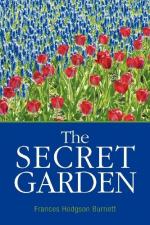“If you had one,” said Mary, “what would you plant?”
“Cabbages an’ ‘taters an’ onions.”
“But if you wanted to make a flower garden,” persisted Mary, “what would you plant?”
“Bulbs an’ sweet-smellin’ things—but mostly roses.”
Mary’s face lighted up.
“Do you like roses?” she said.
Ben Weatherstaff rooted up a weed and threw it aside before he answered.
“Well, yes, I do. I was learned that by a young lady I was gardener to. She had a lot in a place she was fond of, an’ she loved ’em like they was children—or robins. I’ve seen her bend over an’ kiss ’em.” He dragged out another weed and scowled at it. “That were as much as ten year’ ago.”
“Where is she now?” asked Mary, much interested.
“Heaven,” he answered, and drove his spade deep into the soil, “’cording to what parson says.”
“What happened to the roses?” Mary asked again, more interested than ever.
“They was left to themselves.”
Mary was becoming quite excited.
“Did they quite die? Do roses quite die when they are left to themselves?” she ventured.
“Well, I’d got to like ’em—an’ I liked her—an’ she liked ’em,” Ben Weatherstaff admitted reluctantly. “Once or twice a year I’d go an’ work at ’em a bit—prune ’em an’ dig about th’ roots. They run wild, but they was in rich soil, so some of ’em lived.”
“When they have no leaves and look gray and brown and dry, how can you tell whether they are dead or alive?” inquired Mary.
“Wait till th’ spring gets at ’em—wait till th’ sun shines on th’ rain an’ th’ rain falls on th’ sunshine an’ then tha’ll find out.”
“How—how?” cried Mary, forgetting to be careful.
“Look along th’ twigs an’ branches an’ if tha’ sees a bit of a brown lump swelling here an’ there, watch it after th’ warm rain an’ see what happens.” He stopped suddenly and looked curiously at her eager face. “Why does tha’ care so much about roses an’ such, all of a sudden?” he demanded.
Mistress Mary felt her face grow red. She was almost afraid to answer.
“I—I want to play that—that I have a garden of my own,” she stammered. “I—there is nothing for me to do. I have nothing—and no one.”
“Well,” said Ben Weatherstaff slowly, as he watched her, “that’s true. Tha’ hasn’t.”
He said it in such an odd way that Mary wondered if he was actually a little sorry for her. She had never felt sorry for herself; she had only felt tired and cross, because she disliked people and things so much. But now the world seemed to be changing and getting nicer. If no one found out about the secret garden, she should enjoy herself always.
She stayed with him for ten or fifteen minutes longer and asked him as many questions as she dared. He answered every one of them in his queer grunting way and he did not seem really cross and did not pick up his spade and leave her. He said something about roses just as she was going away and it reminded her of the ones he had said he had been fond of.




